belt TOYOTA CAMRY 2011 XV50 / 9.G Owners Manual
[x] Cancel search | Manufacturer: TOYOTA, Model Year: 2011, Model line: CAMRY, Model: TOYOTA CAMRY 2011 XV50 / 9.GPages: 554, PDF Size: 9.69 MB
Page 1 of 554
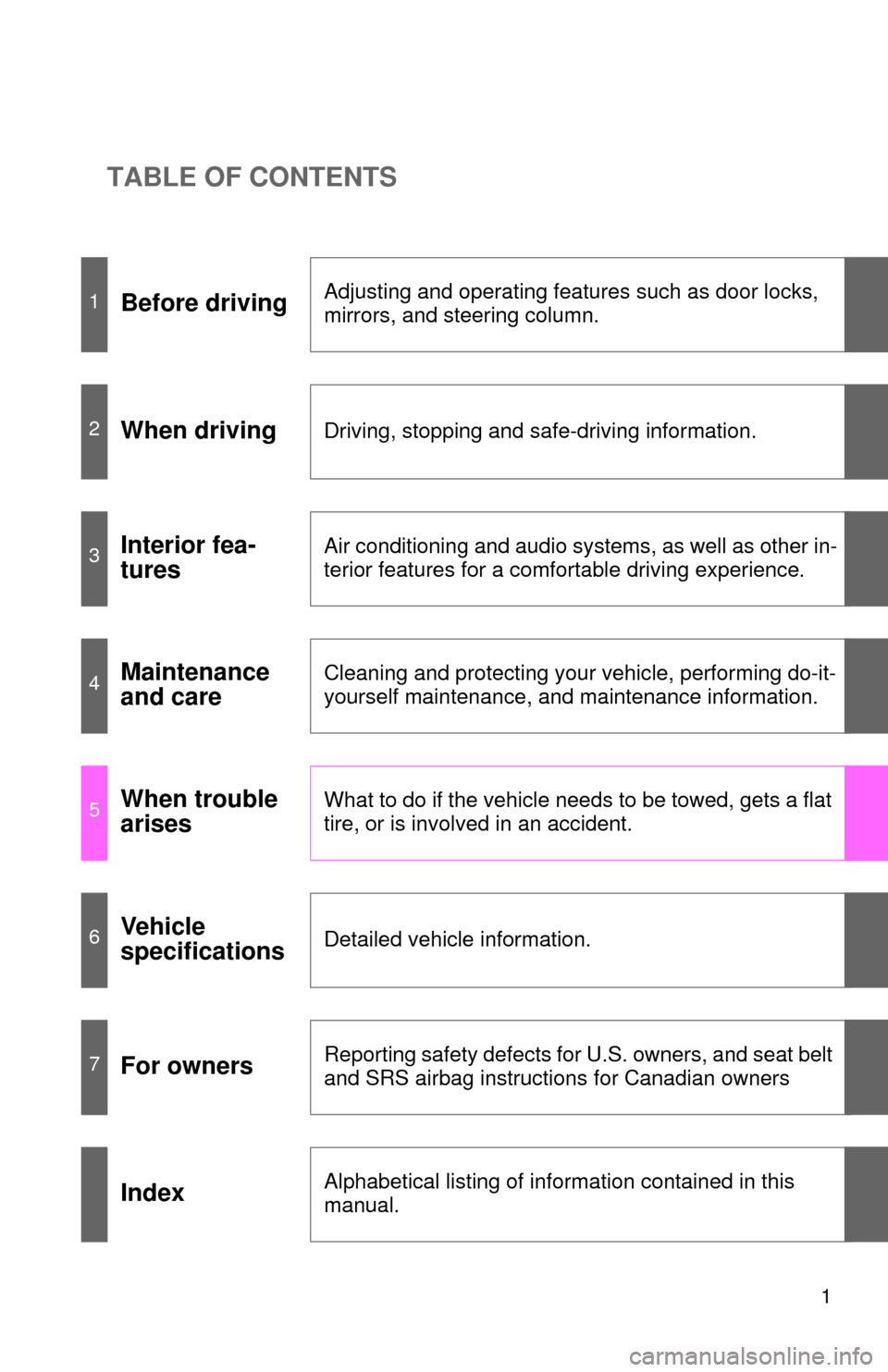
TABLE OF CONTENTS
1
1Before drivingAdjusting and operating features such as door locks,
mirrors, and steering column.
2When drivingDriving, stopping and safe-driving information.
3Interior fea-
turesAir conditioning and audio systems, as well as other in-
terior features for a comfortable driving experience.
4Maintenance
and careCleaning and protecting your vehicle, performing do-it-
yourself maintenance, and maintenance information.
5When trouble
arisesWhat to do if the vehicle needs to be towed, gets a flat
tire, or is involved in an accident.
6Vehicle
specificationsDetailed vehicle information.
7For ownersReporting safety defects for U.S. owners, and seat belt
and SRS airbag instructions for Canadian owners
IndexAlphabetical listing of information contained in this
manual.
Page 2 of 554

TABLE OF CONTENTSIndex
2
1-1. Key informationKeys ..................................... 26
1-2. Opening, closing and locking the doors and
trunk
Smart key system................. 29
Wireless remote control ....... 40
Doors.................................... 44
Trunk .................................... 49
1-3. Adjustable components (seats, mirrors,
steering wheel)
Front seats ........................... 53
Rear seats ............................ 55
Head restraints ..................... 57
Seat belts ............................. 59
Steering wheel ..................... 67
Anti-glare inside rear view mirror.......................... 68
Outside rear view mirrors ..... 70
1-4. Opening and closing the windows and moon roof
Power windows .................... 72
Moon roof ............................. 75
1-5. Refueling Opening the fuel tank cap .... 79 1-6. Theft deterrent system
Engine immobilizer system ................................ 82
Alarm .................................... 85
1-7. Safety information Correct driving posture ......... 88
SRS airbags ......................... 90
Front passenger occupant classification
system .............................. 102
Child restraint systems ....... 107
Installing child restraints ..... 111
2-1. Driving procedures Driving the vehicle .............. 122
Engine (ignition) switch (vehicles with smart
key system) ...................... 133
Engine (ignition) switch (vehicles without smart
key system) ...................... 137
Automatic transmission ...... 140
Manual transmission........... 144
Turn signal lever ................. 146
Parking brake ..................... 147
Horn .................................... 149
2-2. Instrument cluster Gauges and meters ............ 150
Indicators and warning lights ................................. 154
Multi-information display ..... 158
1Before driving
2When driving
Page 6 of 554

TABLE OF CONTENTSIndex
6
6-1. SpecificationsMaintenance data (fuel, oil level, etc.) ........... 488
Fuel information ................. 501
Tire information .................. 504
6-2. Customization Customizable features ....... 516
6-3. Initialization Items to initialize................. 520
Reporting safety defects for U.S. owners ................ 522
Seat belt instructions for Canadian owners
(in French) ........................ 523
SRS airbag instructions for Canadian owners
(in French) ........................ 526
Abbreviation list........................ 538
Alphabetical index .................... 539
What to do if... .......................... 549
6Vehicle specifications
7For owners
Index
Page 10 of 554
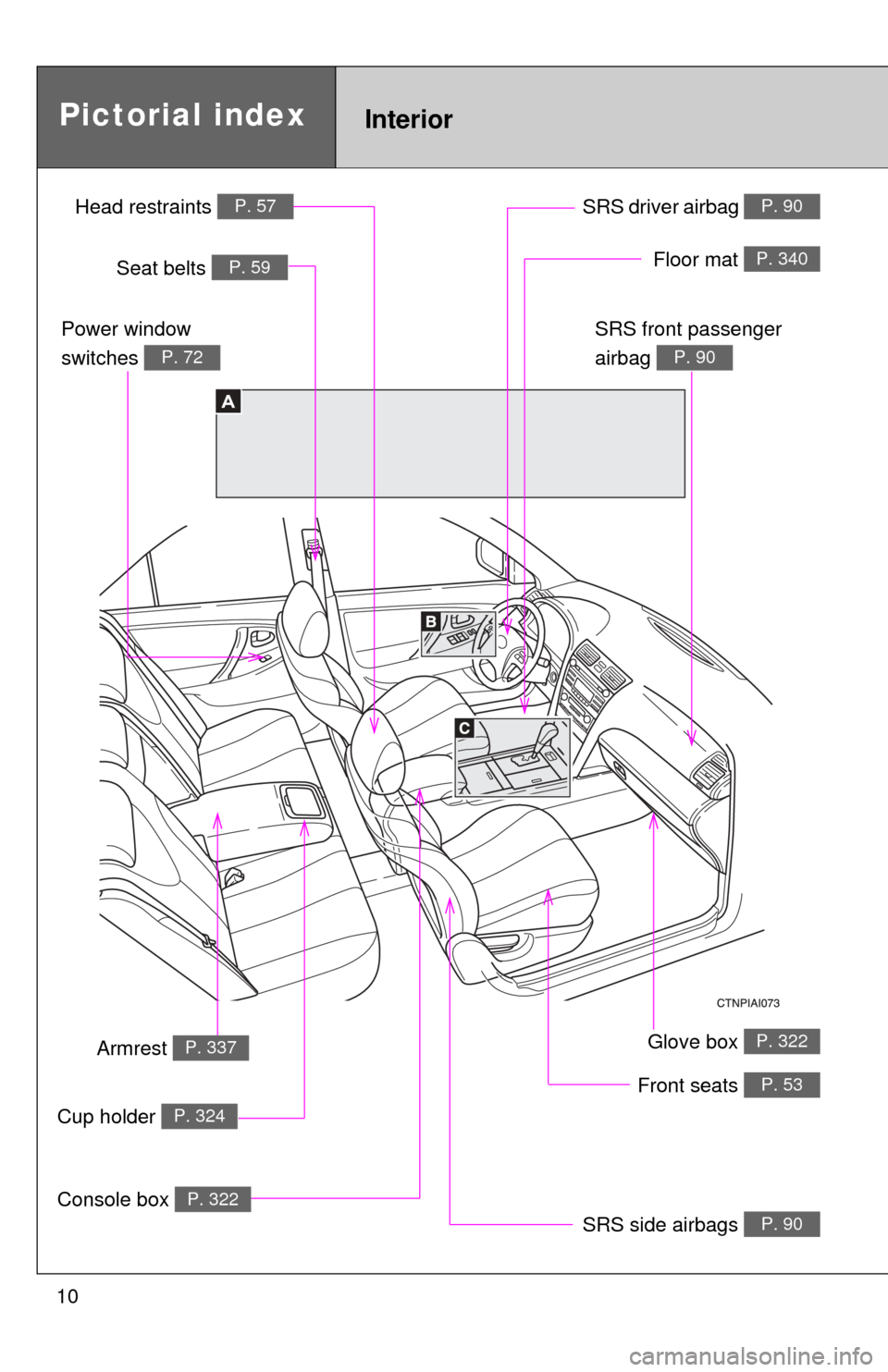
10
Glove box P. 322
Front seats P. 53
SRS side airbags P. 90
Power window
switches
P. 72
Seat belts P. 59
SRS front passenger
airbag
P. 90
SRS driver airbag P. 90
A
Console box P. 322
InteriorPictorial index
Floor mat P. 340
Head restraints P. 57
Armrest P. 337
Cup holder P. 324
Page 21 of 554

21
Installation of a mobile two-way radio system
As the installation of a mobile two-way radio system in your vehicle may
affect electronic systems such as the multi-port fuel injection system/sequen-
tial multi-port fuel injection system, cruise control system, anti-lock brake
system, SRS airbag system or seat belt pretensioner system, be sure to
check with your Toyota dealer for precautionary measures or special instruc-
tions regarding installation.
Scrapping of your Toyota
The SRS airbag and seat belt pretensioner devices in your Toyota contain
explosive chemicals. If the vehicle is scrapped with the airbags and seat belt
pretensioners left as they are, this may cause an accident such as fire. Be
sure to have the systems of the SRS airbag and seat belt pretensioner
removed and disposed of by a qualified service shop or by your Toyota
dealer before you scrap your vehicle.
Perchlorate Material
Special handling may apply, See www.dtsc.ca.gov/hazardouswaste/perchlorate.
Your vehicle has components that may contain perchlorate. These compo-
nents may include airbags, seat belt pretensioners, and wireless remote con-
trol batteries.
Page 25 of 554
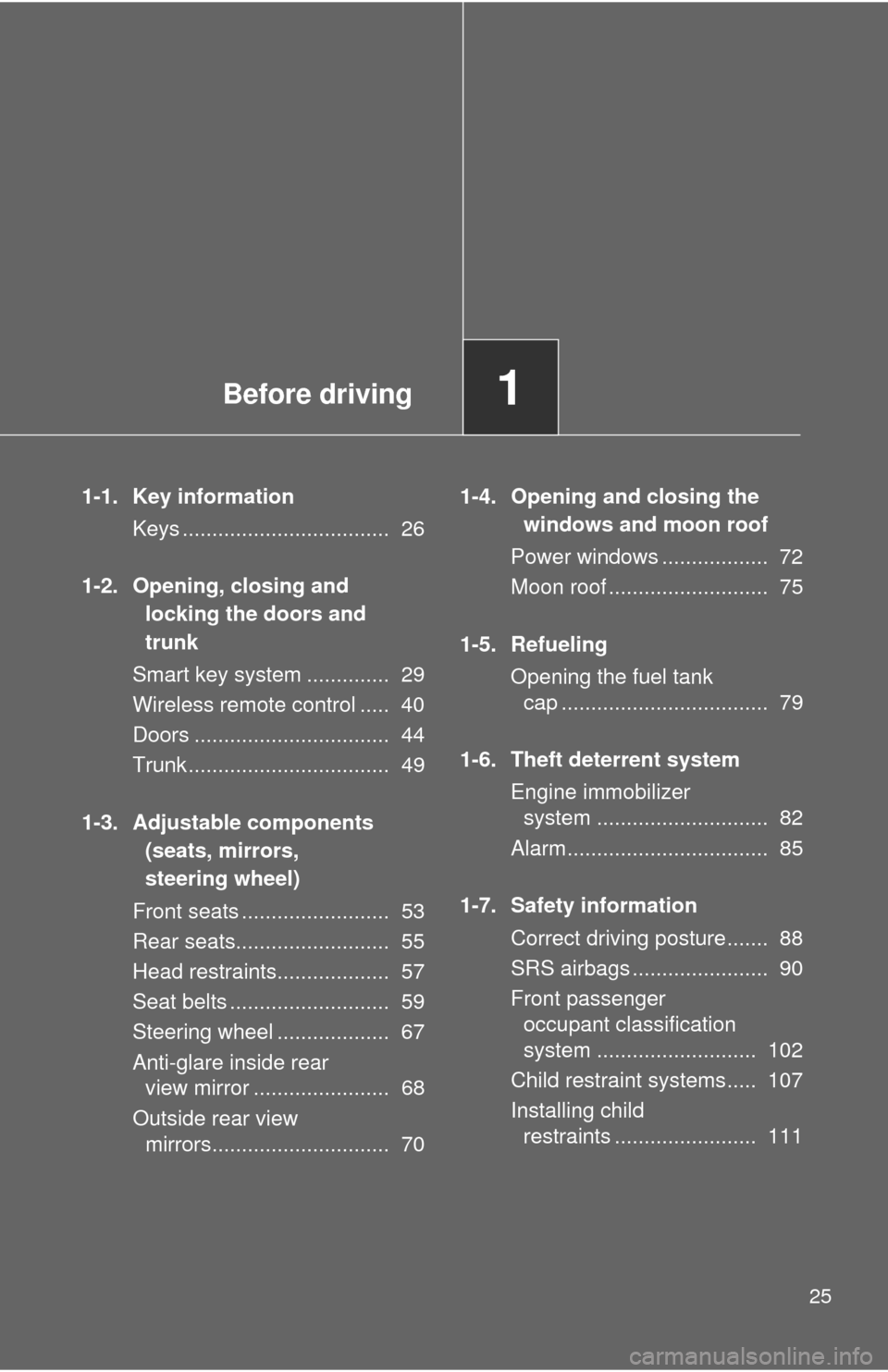
Before driving1
25
1-1. Key informationKeys ................................... 26
1-2. Opening, closing and locking the doors and
trunk
Smart key system .............. 29
Wireless remote control ..... 40
Doors ................................. 44
Trunk .................................. 49
1-3. Adjustable components (seats, mirrors,
steering wheel)
Front seats ......................... 53
Rear seats.......................... 55
Head restraints................... 57
Seat belts ........................... 59
Steering wheel ................... 67
Anti-glare inside rear view mirror ....................... 68
Outside rear view mirrors.............................. 70 1-4. Opening and closing the
windows and moon roof
Power windows .................. 72
Moon roof ........................... 75
1-5. Refueling Opening the fuel tank cap ................................... 79
1-6. Theft deterrent system Engine immobilizer system ............................. 82
Alarm.................................. 85
1-7. Safety information Correct driving posture....... 88
SRS airbags ....................... 90
Front passenger occupant classification
system ........................... 102
Child restraint systems..... 107
Installing child restraints ........................ 111
Page 48 of 554
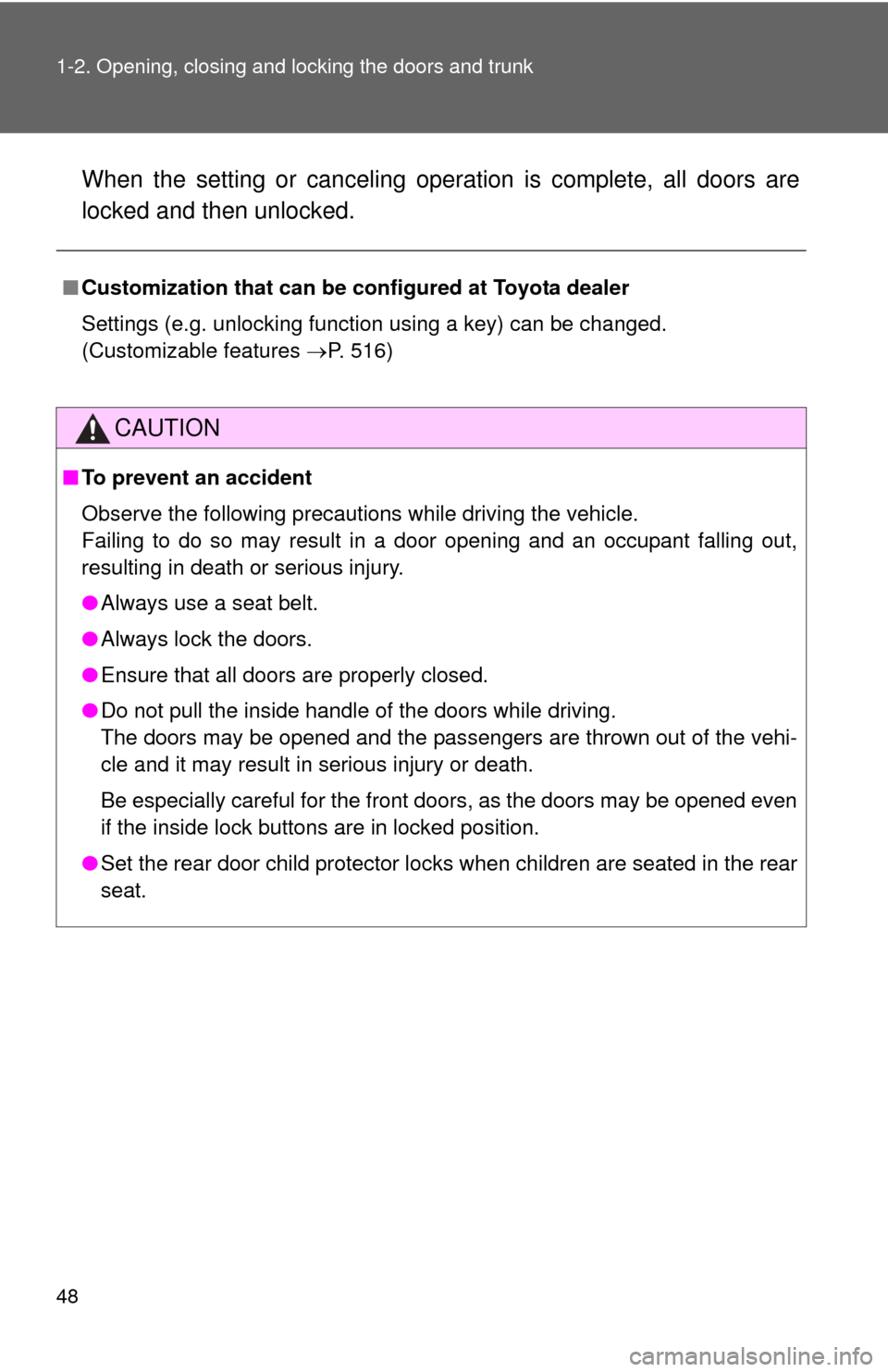
48 1-2. Opening, closing and locking the doors and trunk
When the setting or canceling operation is complete, all doors are
locked and then unlocked.
■Customization that can be co nfigured at Toyota dealer
Settings (e.g. unlocking function using a key) can be changed.
(Customizable features P. 516)
CAUTION
■To prevent an accident
Observe the following precautions while driving the vehicle.
Failing to do so may result in a door opening and an occupant falling out,
resulting in death or serious injury.
●Always use a seat belt.
● Always lock the doors.
● Ensure that all doors are properly closed.
● Do not pull the inside handle of the doors while driving.
The doors may be opened and the passengers are thrown out of the vehi-
cle and it may result in serious injury or death.
Be especially careful for the front doors, as the doors may be opened even
if the inside lock buttons are in locked position.
● Set the rear door child protector locks when children are seated in the rear
seat.
Page 54 of 554
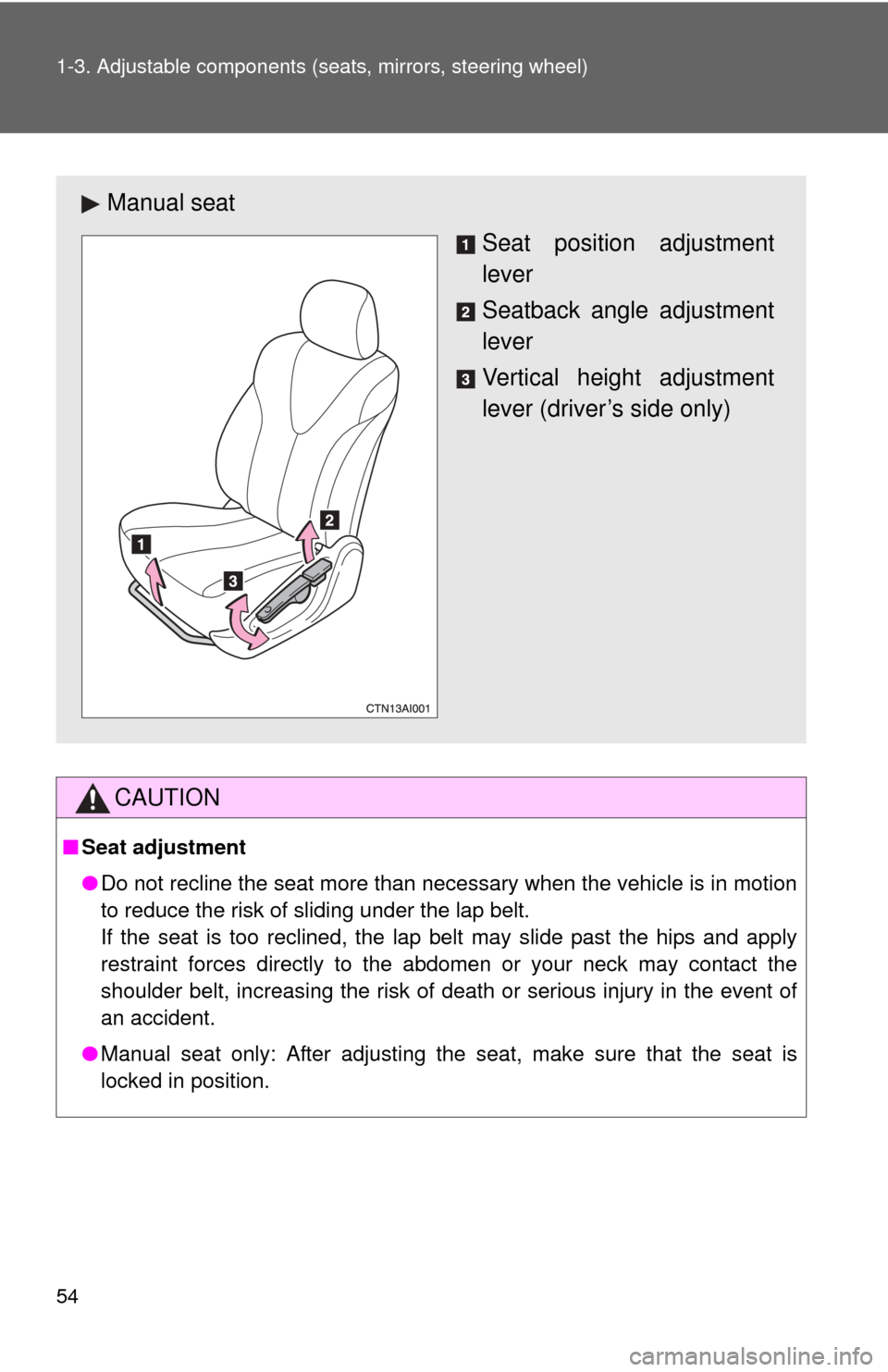
54 1-3. Adjustable components (seats, mirrors, steering wheel)
CAUTION
■Seat adjustment
●Do not recline the seat more than necessary when the vehicle is in motion
to reduce the risk of sliding under the lap belt.
If the seat is too reclined, the lap belt may slide past the hips and apply
restraint forces directly to the abdomen or your neck may contact the
shoulder belt, increasing the risk of death or serious injury in the event of
an accident.
● Manual seat only: After adjusting the seat, make sure that the seat is
locked in position.
Manual seat
Seat position adjustment
lever
Seatback angle adjustment
lever
Vertical height adjustment
lever (driver’s side only)
Page 56 of 554
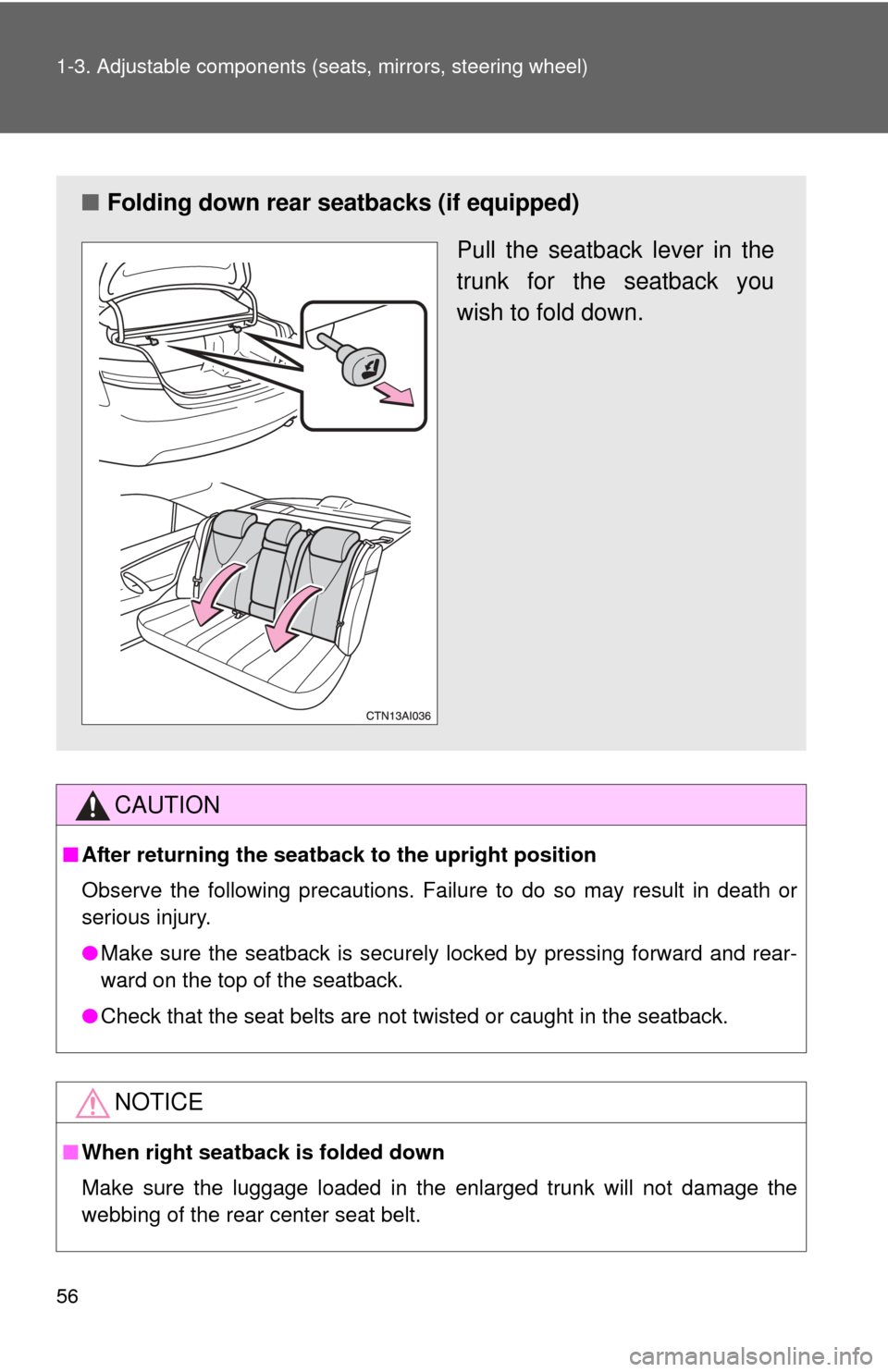
56 1-3. Adjustable components (seats, mirrors, steering wheel)
CAUTION
■After returning the seatback to the upright position
Observe the following precautions. Failure to do so may result in death or
serious injury.
● Make sure the seatback is securely locked by pressing forward and rear-
ward on the top of the seatback.
● Check that the seat belts are not twisted or caught in the seatback.
NOTICE
■When right seatback is folded down
Make sure the luggage loaded in the enlarged trunk will not damage the
webbing of the rear center seat belt.
■ Folding down rear seatbacks (if equipped)
Pull the seatback lever in the
trunk for the seatback you
wish to fold down.
Page 59 of 554
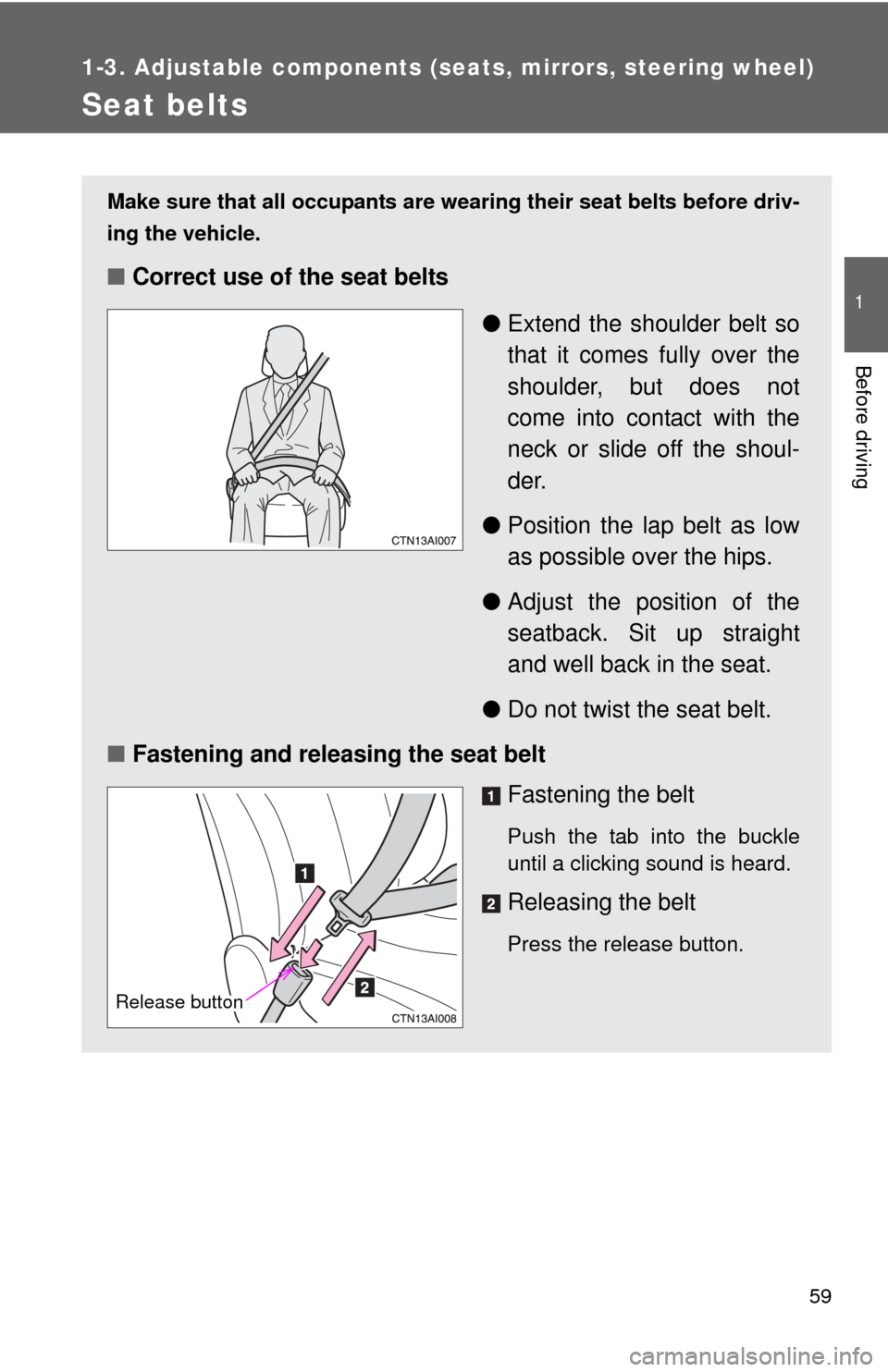
59
1
1-3. Adjustable components (seats, mirrors, steering wheel)
Before driving
Seat belts
Make sure that all occupants are wearing their seat belts before driv-
ing the vehicle.
■Correct use of the seat belts
●Extend the shoulder belt so
that it comes fully over the
shoulder, but does not
come into contact with the
neck or slide off the shoul-
der.
● Position the lap belt as low
as possible over the hips.
● Adjust the position of the
seatback. Sit up straight
and well back in the seat.
● Do not twist the seat belt.
■ Fastening and releasing the seat belt
Fastening the belt
Push the tab into the buckle
until a clicking sound is heard.
Releasing the belt
Press the release button.
Release button